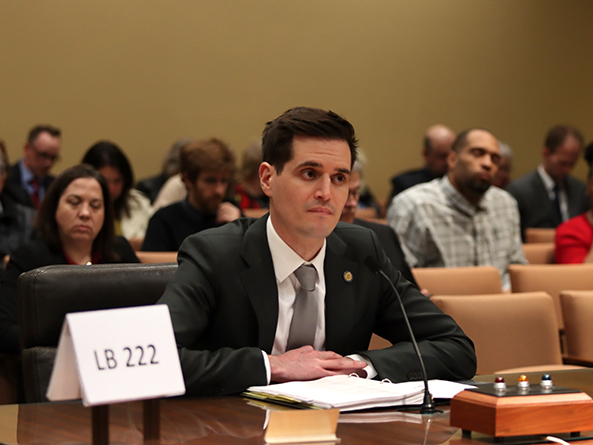Bill would bar inquiries into college applicants’ criminal history
Nebraska’s public higher education institutions could not ask about a person’s criminal background when they apply for admission under a bill heard Feb. 21 by the Education Committee.

Under LB222, introduced by Omaha Sen. John Fredrickson, a public college or university could not inquire about a person’s criminal history or juvenile court record as part of its application and admission process except as required by state and federal law.
Fredrickson said asking about a person’s criminal history during the college admission process deters formerly incarcerated people from applying, which can prevent them from gaining the education and job training they need to reintegrate into society.
“Approximately 95 percent of state prisoners will be released from prison at some point,” he said, “so we need to ensure opportunities are available for them to get the education they need to contribute to our workforce.”
Fredrickson brought an amendment to the hearing that he said is intended to address concerns raised by the University of Nebraska.
He said the amendment would clarify that LB222 would not apply to an institution’s inquiries into criminal history that occur subsequent to admission as part of a professional licensure process or an academically required clinical placement.
Courtney Wittstruck testified in support of the measure on behalf of the Nebraska Community College Association. She said it would provide greater access to higher education for more Nebraskans while still allowing postsecondary institutions to ask about a person’s criminal history when they apply for on-campus housing or particular academic programs, such as early childhood education.
Also in support was Jasmine Harris of RISE, a nonprofit that offers rehabilitation programs in several Nebraska prisons.
Harris said many RISE participants take college courses offered by Metropolitan Community College and the University of Nebraska at Omaha while in prison. Such participation in higher education programs by incarcerated people has been shown to reduce recidivism by 48 percent, she said.
“LB222 will offer people like our [participants] coming out of incarceration the opportunity to continue their higher education aspirations without having to bear the guilt and shame of checking a box on an admissions application,” Harris said.
Rose Godinez testified in support of the bill on behalf of the ACLU of Nebraska. Research shows that asking about an applicant’s criminal history during college admission does nothing to enhance public safety but does deter individuals from applying, she said.
No one testified in opposition to LB222 and the committee took no immediate action on it.


